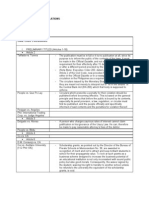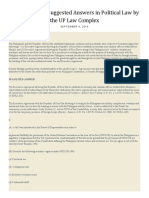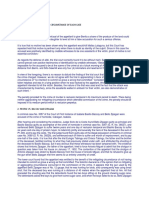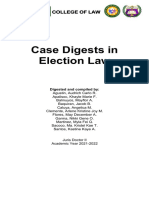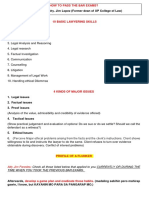Political Law Essay Exam With Answer
Political Law Essay Exam With Answer
Uploaded by
John DillingerCopyright:
Available Formats
Political Law Essay Exam With Answer
Political Law Essay Exam With Answer
Uploaded by
John DillingerCopyright
Available Formats
Share this document
Did you find this document useful?
Is this content inappropriate?
Copyright:
Available Formats
Political Law Essay Exam With Answer
Political Law Essay Exam With Answer
Uploaded by
John DillingerCopyright:
Available Formats
I.
The Philippines has become a member of the World Trade Organization (WTO) and resultantly agreed that it "shall ensure the conformity of its laws, regulations and administrative procedures with its obligations as provided in the annexed Agreements." This is assailed as unconstitutional because this undertaking unduly limits, restricts and impairs Philippine sovereignty and means among others that Congress could not pass legislation that will be good for our national interest and general welfare if such legislation will not conform with the WTO Agreements. Refute this argument. (5%) SUGGESTED ANSWER: According to Tanada v. Angara, 272 SCRA 18 (1997), the sovereignty of the Philippines is subject to restriction by its membership in the family of nations and the limitations imposed of treaty limitations. Section 2. Article II of the Constitution adopts the generally accepted principles of international law as part of the law of the land. One of such principles is pacta sunt servanda. The Constitution did not envision a hermit-like isolation of the country from the rest of the world. II. The legal yardstick in determining whether usage has become customary international law is expressed in the maxim opinio juris sive necessitates or opinio juris for short. What does the maxim mean? A. The maxim opinio juris sive necessitates or simply opinio juris means that States observe a practice or a norm out of a sense of legal obligation or a belief in its juridical necessity. Opinio juris is the subjective element of international customs, the objective element being the long and consistent practice of States. III. Under international law, differentiate hard law from soft law. (3%) A. Hard law refers to binding international legal norms or those which have coercive character. Soft law, on the other hand, refers to norms that are non-binding in character but still have legal relevance. Examples of hard law are the provisions of the U.N. Charter, the Vienna Convention on Diplomatic Relations, the Geneva Conventions of 1949 and other treaties in force. Examples of soft law are resolutions of the U.N. General Assembly and draft articles of the International Law Commission. Soft law usually serves as a precursor of hard law. The Universal Declaration of Human Rights is one such example. It was a soft law when it was adopted by resolution of the U.N. General Assembly in 1948, but it has led to the development of hard law with the adoption of two binding covenants on human rights, i.e., the International Covenant on Civil and Political Rights and the International Covenant on Economic, Social and Cultural Rights.
IV. May a treaty violate international law? If your answer is in the affirmative, explain when such may happen. If your answer is in the negative, explain why. (5%) A. Yes, a treaty may violate international law when at the time of its conclusion, it conflicts with a peremptory norm of general international law (jus cogens) or if its conclusion has been procured by the threat or use of force in violation of the principles of international law embodied in the Charter of the United Nations. (Vienna Convention on the Law of Treaties, Arts. 52 & 53) V. The President alone without the concurrence of the Senate abrogated a treaty. Assume that the other country-party to the treaty is agreeable to the abrogation provided it complies with the Philippine Constitution. If a case involving the validity of the treaty abrogation is brought to the Supreme Court, how should it be resolved? A. The Supreme Court should sustain the validity of the treaty abrogation. While the Constitution is express as to the manner in which the Senate shall participate in the ratification of a treaty, it is silent as to that body's participation in the abrogation of a treaty. In light of the absence of any constitutional provision governing the termination of a treaty, and the fact that different termination procedures may be appropriate for different treaties, the case must surely be controlled by political standards, even more so because it involves the conduct of foreign relations. VI. The Department of National Defense entered into a contract with Raintree Corporation for the supply of ponchos to the Armed Forces of the Philippines (AFP), stipulating that, in the event of breach, action may be filed in the proper courts in Manila. Suppose the AFP fails to pay for delivered ponchos, where must Raintree Corporation file its claim? Why? SUGGESTED ANSWER: Raintree Corporation must file its claim with the Commission on Audit, Under Section 2(1) IX-D of the Constitution, the Commission on Audit has the authority to settle all accounts pertaining to expenditure of public funds. Raintree Corporation cannot file a case in court. The Republic of the Philippines did not waive its immunity from suit when it entered into the contract with Raintree Corporation for the supply of ponchos for the use of the Armed Forces of the Philippines. The contract involves the defense of the Philippines and therefore relates to a sovereign function. In United States vs. Ruiz, 136 SCRA 487, 492, the Supreme Court held; "The restrictive application of State immunity is proper only when the proceedings arise out of commercial transactions of the foreign
sovereign. Its commercial activities or economic affairs. Stated differently, a State may be said to have descended to the level of an individual and can thus be deemed to have tacitly given its consent to be sued only when it enters into business contracts. It does not apply where the contract relates to the exercise of its sovereign functions. In this case the projects are an integral part of the naval base which is devoted to the defense of both the United States and the Philippines, indisputably a function of the government of the highest order; they are not utilized for nor dedicated to commercial or business purposes." The provision for venue in the contract does not constitute a waiver of the State Immunity from suit, because the express waiver of this immunity can only be made by a statute. In Republic us. Purisima 78 SCRA 470, 474, the Supreme Court ruled: "Apparently respondent Judge was misled by the terms of the contract between the private respondent, plaintiff in his sala and defendant Rice and Corn Administration which, according to him, anticipated the case of a breach of contract between the parties and the suits that may thereafter arise. The consent, to be effective though, must come from the State acting through a duly enacted statute as pointed out by Justice Bengzon in Mobil." ALTERNATIVE ANSWER: In accordance with the doctrine of exhaustion of administrative remedies, Raintree Corporation should first file a claim with the Commission on Audit. If the claim is denied, it should file a petition for certiorari with the Supreme Court. VII. A vacancy occurred in the sangguniang bayan of a municipality when X, a member, died. X did not belong to any political party. To fill up the vacancy, the provincial governor appointed A upon the recommendation of the sangguniang panlalawigan. On the other hand, for the same vacancy, the municipal mayor appointed B upon the recommendation of the sangguniang bayan. Which of these appointments is valid? SUGGESTED ANSWER: As held in Farinas v. Barba, 256 SCRA 396 (1996), neither of the appointments is valid. Under Section 45 of the Local Government Code, in case of a permanent vacancy in the Sangguniang Bayan created by the cessation in office of a member who does not belong to any political party, the Governor shall appoint a qualified person recommended by the Sangguniang Bayan. Since A was not recommended by the Sangguniang Bayan, his appointment by the Governor is not valid. Since B was not appointed by the Governor but by the Municipal Mayor, his appointment is also not valid.
VIII. BNN Republic has a defense treaty with EVA Federation. According to the Republic's Secretary of Defense, the treaty allows temporary basing of friendly foreign troops in case of training exercises for the war on terrorism. The Majority Leader of the Senate contends that whether temporary or not, the basing of foreign troops however friendly is prohibited by the Constitution of BNN which provides that, "No foreign military bases shall be allowed in BNN territory." In case there is indeed an irreconcilable conflict between a provision of the treaty and a provision of the Constitution, in a jurisdiction and legal system like ours, which should prevail: the provision of the treaty or of the Constitution? Why? Explain with reasons, briefly. SUGGESTED ANSWER: In case of conflict between a provision of a treaty and a provision of the Constitution, the provision of the Constitution should prevail. Section 5(2)(a), Article VIII of the 1987 Constitution authorizes the nullification of a treaty when it conflicts with the Constitution. (Gonzales v. Hechanova, 9 SCRA 230 [1963]). IX. Rafael, Carlos and Joseph were accused of murder before the Regional Trial Court of Manila. Accused Joseph turned state witness against his co-accused Rafael and Carlos, and was accordingly discharged from the information. Among the evidence presented by the prosecution was an extrajudicial confession made by Joseph during the custodial Investigation, implicating Rafael and Carlos who, he said, together with him (Joseph), committed the crime. The extrajudicial confession was executed without the assistance of counsel. Accused Rafael and Carlos vehemently objected on the ground that said extrajudicial confession was inadmissible in evidence against them. Rule on whether the said extrajudicial confession is admissible in evidence or not. FIRST ALTERNATIVE ANSWER: According to People vs. Balisteros, 237 SCRA 499 (1994), the confession is admissible. Under Section 12, Article III of the Constitution, the confession is inadmissible only against the one who confessed. Only the one whose rights were violated can raise the objection as his right is personal. SECOND ALTERNATIVE ANSWER; According to People us. Jara, 144 SCRA 516(1986), the confession is inadmissible. If it is inadmissible against the one who confessed, with more reason it should be inadmissible against others. X
"X" a Constabulary Officer, was arrested pursuant to a lawful court order in Baguio City for murder. He was brought to Manila where a warrantless search was conducted in his official quarters at Camp Crame, The search team found and seized the murder weapon in a drawer of "X". Can "X" claim that the search and seizure were illegal and move for exclusion from evidence of the weapon seized? Explain. SUGGESTED ANSWER: Yes, "X" can do so. The warrantless search cannot be justified as an incident of a valid arrest, because considerable time had elapsed after his arrest in Baguio before the search of his quarters in Camp Crame, Quezon City was made, and because the distance between the place of arrest and the place of search negates any claim that the place searched is within his "immediate control" so as to justify the apprehension that he might destroy or conceal evidence of crime before a warrant can be obtained. (Chimel v. California, 395 U.S. 752 (1969) ) in Nolasco v. Cruz Pano, 147 SCRA 509 (1987), the Supreme Court reconsidered its previous decision holding that a warrantless search, made after 30 minutes from the time of arrest, and, in a place several blocks away from the place of arrest, was valid. It held that a warrantless search is limited to the search of the person of the arrestee at the time and incident to his arrest and for dangerous weapons or anything which may be used as proof of the offense. A contrary rule would justify the police in procuring a warrant of arrest and, by virtue thereof, not only arrest the person but also search his dwelling. A warrant requires that all facts as to the condition of the property and its surroundings and its improvements and capabilities must be considered, and this can only be done in a judicial proceeding.
You might also like
- Bar Questions and Suggested Answer For Constititutional Law 1Document9 pagesBar Questions and Suggested Answer For Constititutional Law 1Carla DomingoNo ratings yet
- Criminal Law Reviewer Notes (Reyes Book 1)Document4 pagesCriminal Law Reviewer Notes (Reyes Book 1)Mharey100% (3)
- De Guia Vs Guingona DigestDocument1 pageDe Guia Vs Guingona DigestBint Manan100% (1)
- Quiz #4 - EduardoDocument1 pageQuiz #4 - EduardoRayBradleyEduardoNo ratings yet
- Political Law Mock Bar AnswersDocument2 pagesPolitical Law Mock Bar Answersseventhwitch100% (1)
- 2021 Mock Bar Examinations Legal and Judicial Ethics and Practical Exercises Questions and Suggested AnswersDocument23 pages2021 Mock Bar Examinations Legal and Judicial Ethics and Practical Exercises Questions and Suggested AnswersDD CCNo ratings yet
- 2017 Bar Examinations POLITICAL LAW Questions and Suggested AnswersDocument15 pages2017 Bar Examinations POLITICAL LAW Questions and Suggested AnswersGretchen Alunday Suarez100% (1)
- Political Law Suggested Answers 2019Document23 pagesPolitical Law Suggested Answers 2019sonya80% (5)
- Treaty Vs Executive AgreementDocument12 pagesTreaty Vs Executive AgreementExistentialist5alday100% (1)
- Queens Regulations Incl A27Document571 pagesQueens Regulations Incl A27Damian Phillips100% (1)
- What Is Poverty - Edited (1) - RevDocument3 pagesWhat Is Poverty - Edited (1) - RevAnthony WambuaNo ratings yet
- Rules of SuccessionDocument3 pagesRules of SuccessionArvhie SantosNo ratings yet
- Sharia Midterm ReviewerDocument1 pageSharia Midterm ReviewerEarl TanNo ratings yet
- Modifying Circumstances ReviewerDocument9 pagesModifying Circumstances ReviewerQuintos AssociatesNo ratings yet
- Freedom of Speech - ATA EditedDocument7 pagesFreedom of Speech - ATA EditedDMMCorrespondent Lady Belle100% (1)
- Separate Opinions (Imbong Vs Ochoa) - LeonenDocument2 pagesSeparate Opinions (Imbong Vs Ochoa) - LeonenErwinRommelC.FuentesNo ratings yet
- Crim Law 2015 Bar Q and ADocument15 pagesCrim Law 2015 Bar Q and AMaria BethNo ratings yet
- Social Justice Definition (Memorize Calalang v. Williams)Document42 pagesSocial Justice Definition (Memorize Calalang v. Williams)Jezreel CastañagaNo ratings yet
- 18 - CA 327 As Amended by PD 1445Document1 page18 - CA 327 As Amended by PD 1445Aquiline ReedNo ratings yet
- CASE DIGEST Remigio Quiqui Et Al Vs Hon Alejandro R Boncarlos Et AlDocument2 pagesCASE DIGEST Remigio Quiqui Et Al Vs Hon Alejandro R Boncarlos Et AlEvangelyn Egusquiza100% (1)
- Case Doctrines On Constitutional Law 01 PDFDocument189 pagesCase Doctrines On Constitutional Law 01 PDFReg AnasNo ratings yet
- Crim Pro 2004-2010 Bar QuestionsDocument4 pagesCrim Pro 2004-2010 Bar QuestionsDennie Vieve IdeaNo ratings yet
- Persons and Family 5 Star ProvisionsDocument10 pagesPersons and Family 5 Star ProvisionsOtep Belciña LumabasNo ratings yet
- Chairperson 2009 Bar Examinations Committee: Criminal LawDocument4 pagesChairperson 2009 Bar Examinations Committee: Criminal LawMaria Cristina MartinezNo ratings yet
- Roxas Exercise No. 2Document1 pageRoxas Exercise No. 2jasmines spamNo ratings yet
- Orca Share Media1636611080851 6864444402860010037Document4 pagesOrca Share Media1636611080851 6864444402860010037Huda A. SalindawanNo ratings yet
- Midterm Examination Crim Law 2 JD-1B 2020-2021 AYDocument9 pagesMidterm Examination Crim Law 2 JD-1B 2020-2021 AY师律No ratings yet
- Midterm 2020Document2 pagesMidterm 2020Jica GulaNo ratings yet
- Constitutional Law 1 Case Digest (Partial)Document10 pagesConstitutional Law 1 Case Digest (Partial)Mythel SolisNo ratings yet
- Jeffrey Liang vs. People of The PhilippinesDocument2 pagesJeffrey Liang vs. People of The PhilippinesJohn Ludwig Bardoquillo PormentoNo ratings yet
- Article 1-2 - Digests, Bar QsDocument5 pagesArticle 1-2 - Digests, Bar QsGeorge PandaNo ratings yet
- Political Law A. The Constitution Definition, Nature and ConceptsDocument284 pagesPolitical Law A. The Constitution Definition, Nature and ConceptsFairyssa Bianca SagotNo ratings yet
- BAR EXAMINATION 2006 - PoliticalandPublicInternationalLawDocument10 pagesBAR EXAMINATION 2006 - PoliticalandPublicInternationalLawLyraNo ratings yet
- PFR Case DoctrinesDocument22 pagesPFR Case Doctrinessharppy38100% (1)
- Digest - Palencia v. People G.R. No. 219560Document3 pagesDigest - Palencia v. People G.R. No. 219560MARY ANGELIQUE CABALNo ratings yet
- Attorneys Claiming Influence or Familiarity To The CourtDocument13 pagesAttorneys Claiming Influence or Familiarity To The CourtKhen TamdangNo ratings yet
- 2022 Criminal Law Bar Exam by Judge Marlo CampanillaDocument8 pages2022 Criminal Law Bar Exam by Judge Marlo CampanillasoyapcyNo ratings yet
- Romualdez V Sandiganbayan IpadDocument10 pagesRomualdez V Sandiganbayan IpadBoom ManuelNo ratings yet
- 2023 JOAP Suggested Answers To The Civil Law Mock Bar ExaminationDocument9 pages2023 JOAP Suggested Answers To The Civil Law Mock Bar Examinationsay.reubenNo ratings yet
- Bgy Conciliation Preliminary InjunctionDocument1 pageBgy Conciliation Preliminary InjunctionRyan AcostaNo ratings yet
- Assignment-Distinction of Recidivism, Habituality, HD, QuasiDocument2 pagesAssignment-Distinction of Recidivism, Habituality, HD, QuasiMelca PeruNo ratings yet
- Digested Cases For Stat ConDocument3 pagesDigested Cases For Stat ConJenifer PaglinawanNo ratings yet
- Bar ExamsDocument12 pagesBar ExamsJESSIE DAUGNo ratings yet
- Criminal Law 2022 Bar Q&aDocument7 pagesCriminal Law 2022 Bar Q&amarko.sanchez.2023No ratings yet
- Midterms LaborDocument4 pagesMidterms LaborDonnie Ray SolonNo ratings yet
- Persons and Family Relations (Reviewer)Document9 pagesPersons and Family Relations (Reviewer)Lemuel Angelo M. EleccionNo ratings yet
- Crim Notes Transcription Part 1 Lecture by FestinDocument6 pagesCrim Notes Transcription Part 1 Lecture by FestinchristineNo ratings yet
- UMak BarOps 2021-2022 Landmark Case Q&As - Criminal LawDocument6 pagesUMak BarOps 2021-2022 Landmark Case Q&As - Criminal LawJoe Mari PiconesNo ratings yet
- Commercial Law SyllabusDocument39 pagesCommercial Law SyllabusJanine Blaize Oplay Caniw0% (1)
- Suarez-Principles-Comments-Cases-Reviewer-Chap.-1-10 (MB MG ML)Document36 pagesSuarez-Principles-Comments-Cases-Reviewer-Chap.-1-10 (MB MG ML)Jeul AzueloNo ratings yet
- The Law Pertaining To The State and Its Relationship With Its Citizens (Formerly Political Law, Labor Law and Taxation)Document98 pagesThe Law Pertaining To The State and Its Relationship With Its Citizens (Formerly Political Law, Labor Law and Taxation)Mahri Rieanne Delle LangbisNo ratings yet
- 2015 Political Law Bar Exam Suggested AnswersDocument13 pages2015 Political Law Bar Exam Suggested AnswersRichelle NoblefrancaNo ratings yet
- SPL 1-Activity 2Document1 pageSPL 1-Activity 2Judelyn AcostaNo ratings yet
- Case Digest For ADELDocument2 pagesCase Digest For ADELmanoi paogNo ratings yet
- Criminal Law Mitigating CircumstancesDocument27 pagesCriminal Law Mitigating CircumstancesJoseph John Santos RonquilloNo ratings yet
- Case Digests in Election LawDocument27 pagesCase Digests in Election LawErnesto GalapateNo ratings yet
- 2016 Bar Exam Suggested Answers in Criminal Law by The UP Law Complex FEBRUARY 16Document11 pages2016 Bar Exam Suggested Answers in Criminal Law by The UP Law Complex FEBRUARY 16Ernuel PestanoNo ratings yet
- I. Compositions and QualificationsDocument24 pagesI. Compositions and QualificationsEugene DayanNo ratings yet
- POE vs. ARROYO RespondentDocument14 pagesPOE vs. ARROYO RespondentMoireeGNo ratings yet
- A. Lim vs. CA Case DigestDocument3 pagesA. Lim vs. CA Case DigestRadz BolambaoNo ratings yet
- Sample QuestionDocument2 pagesSample QuestionMel ManatadNo ratings yet
- Political LawDocument45 pagesPolitical LawjayrNo ratings yet
- ETHICS Module 2Document8 pagesETHICS Module 2Maldives CanadaNo ratings yet
- GROUP TASK-Group 5-SS2A-1st Sem-Educ102Document9 pagesGROUP TASK-Group 5-SS2A-1st Sem-Educ102Stephen MejiaNo ratings yet
- 8 Success Secrets From Motivational ExpertsDocument7 pages8 Success Secrets From Motivational ExpertsEmmanuel OlmoguezNo ratings yet
- Group 2 Group Activity No. 3 FinalsDocument4 pagesGroup 2 Group Activity No. 3 FinalsDaniella FallaNo ratings yet
- Mpu 3401 Muhammad Danish Adam Bin Azaman 1191201250Document5 pagesMpu 3401 Muhammad Danish Adam Bin Azaman 1191201250Danish AdamNo ratings yet
- Utilitarianism: J.S. MillDocument30 pagesUtilitarianism: J.S. MillfrttfthgfagfvhjmgbNo ratings yet
- Naskah PublikasiDocument12 pagesNaskah PublikasiAnggoro IstNo ratings yet
- Rhythm Systems KPI Guide (Updated) PDFDocument6 pagesRhythm Systems KPI Guide (Updated) PDFjorge mormarNo ratings yet
- Know The EnemyDocument34 pagesKnow The EnemysombeeNo ratings yet
- Engl9-Q4-Module2 - Judge The Relevance and Worth of IdeasDocument9 pagesEngl9-Q4-Module2 - Judge The Relevance and Worth of IdeasEdilbert Bonifacio GayoNo ratings yet
- Why Men Cant IronDocument3 pagesWhy Men Cant IronMateusz KarpińskiNo ratings yet
- How To Pass The Bar Exam Seminar by Atty Jim Lopez of Up LawDocument28 pagesHow To Pass The Bar Exam Seminar by Atty Jim Lopez of Up LawLorebeth España93% (14)
- Peoples Aircargo v. CADocument2 pagesPeoples Aircargo v. CAVince MontealtoNo ratings yet
- Transforming The Frontier by Bram BüscherDocument47 pagesTransforming The Frontier by Bram BüscherDuke University Press100% (1)
- Notice To Candidates: Disqualification WarningDocument2 pagesNotice To Candidates: Disqualification WarningGianella PachecoNo ratings yet
- Aesthetics As Politics RanciereDocument3 pagesAesthetics As Politics RanciereAleksandar JevremovicNo ratings yet
- NEU Professional Issues - Course OutlineDocument23 pagesNEU Professional Issues - Course OutlineJofrank RiegoNo ratings yet
- A Framework For Safe Reliable and Effective Care PDFDocument32 pagesA Framework For Safe Reliable and Effective Care PDFBassam AlqadasiNo ratings yet
- 1343871530LEADERSHIPDocument11 pages1343871530LEADERSHIPFelix Yesudas0% (1)
- 2012-A Conceptual Framework For Clinical Work With Transgender and Gender Nonconforming Clients, Minority Stress ModelDocument8 pages2012-A Conceptual Framework For Clinical Work With Transgender and Gender Nonconforming Clients, Minority Stress ModeljuaromerNo ratings yet
- Amex V CorderoDocument2 pagesAmex V CorderoJames Evan I. ObnamiaNo ratings yet
- Essay On PlagiarismDocument5 pagesEssay On Plagiarismsohan hazraNo ratings yet
- Eea 13Document16 pagesEea 13Christian Makande0% (1)
- Img 20151011 0002Document5 pagesImg 20151011 0002api-293721825No ratings yet
- Civil Religion in America by Robert NDocument12 pagesCivil Religion in America by Robert NJaime VilarroigNo ratings yet
- Mathematical Population Studies: An International Journal of Mathematical DemographyDocument2 pagesMathematical Population Studies: An International Journal of Mathematical DemographyEugenio MartinezNo ratings yet
- Whistle Blowing Presentation FinalDocument32 pagesWhistle Blowing Presentation Finalmy_857022614No ratings yet
- 2014 Anoikos Wikis Industrial and Organizational Psychology PDFDocument296 pages2014 Anoikos Wikis Industrial and Organizational Psychology PDFKarl MesinaNo ratings yet

































